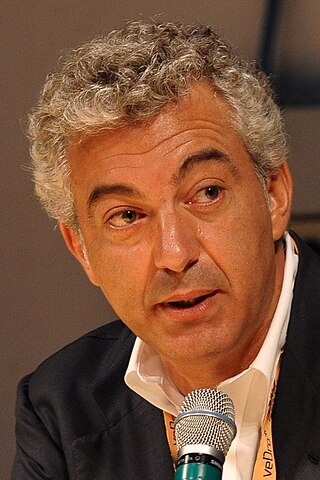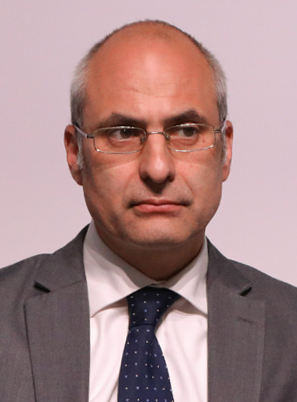
Mario Draghi is an Italian economist, academic, banker, statesman and civil servant who served as the prime minister of Italy from February 2021 to October 2022. Prior to his appointment as prime minister, he served as President of the European Central Bank (ECB) between 2011 and 2019. Draghi was also Chair of the Financial Stability Board between 2009 and 2011, and Governor of the Bank of Italy between 2006 and 2011.

Sergio Mattarella is an Italian politician, jurist, academic, and lawyer who is currently serving as the 12th president of Italy since 2015. He is the longest-serving president in the history of the Italian Republic. Since Giorgio Napolitano's death in 2023, Mattarella has been the only living Italian president.

The Protezione Civile, officially Dipartimento della Protezione Civile, is the national body in Italy that deals with the prediction, prevention and management of emergency events. It was established in 1992 by legge 24 febbraio 1992, n. 225, which was updated in 2012, and it is supervised by the office of the Prime Minister. The duties of the Protezione Civile are to predict, prevent and manage at national level disasters and catastrophes, both natural and human-made. The main goal is to protect the sake of life, the properties, the settlements and the environment from damage and dangers.

Giuseppe Zamberletti was an Italian politician and one of the founders of Italy's Protezione Civile, of which he was the first minister in Italy from 1981.

Pietro Ichino is an Italian politician and professor of labor law at the University of Milan. From 1979 to 1983, he was an independent left-wing MP belonging to the ranks of the Italian Communist Party. In 2008, he was elected senator for the Democratic Party in the district of Lombardy.

Stefano Bonaccini is an Italian politician and member of the Democratic Party (PD), of which he is serving as president since 12 March 2023. In 2024, he was elected to the European Parliament to represent North-East Italy.

Roberto Speranza is an Italian politician of the Chamber of Deputies who served as national secretary of Article One. From 5 September 2019 until 22 October 2022, he has been serving as Minister of Health in the government of Prime Minister Giuseppe Conte and was later confirmed by Prime Minister Mario Draghi. During his tenure, he had to face the COVID-19 pandemic, which deeply affected Italy.

Giuseppe Conte is an Italian jurist, academic, and politician who served as prime minister of Italy from June 2018 to February 2021. He has been the president of the Five Star Movement (M5S) since August 2021.
Events during the year 2019 in Italy.

The second Conte government was the 66th government of the Italian Republic and the second government led by Giuseppe Conte. The government was sworn in on 5 September 2019 to 13 February 2021.
Events during the year 2020 in Italy.
The COVID-19 pandemic in Italy is part of the ongoing pandemic of coronavirus disease 2019 caused by severe acute respiratory syndrome coronavirus 2.
On 9 March 2020, the government of Italy under Prime Minister Giuseppe Conte imposed a national lockdown or quarantine, restricting the movement of the population except for necessity, work, and health circumstances, in response to the growing pandemic of COVID-19 in the country. Additional lockdown restrictions mandated the temporary closure of non-essential shops and businesses. This followed a restriction announced on the previous day which affected sixteen million people in the whole region of Lombardy and in fourteen largely-neighbouring provinces in Emilia-Romagna, Veneto, Piedmont and Marche, and prior to that a smaller-scale lockdown of ten municipalities in the province of Lodi and one in the province of Padua that had begun in late February.

National responses to the COVID-19 pandemic have been varied, and have included containment measures such as lockdowns, quarantines, and curfews. As of 21 September 2024, 776,204,376 cases of COVID-19 have been reported, resulting in 7,064,367 reported deaths. The most affected countries in terms of confirmed cases are the United States, Brazil, India, Russia, South Africa, Peru, Mexico, Chile, the United Kingdom, and Iran.

The COVID-19 vaccination campaign in Italy is a mass immunization campaign that was put in place by the Italian government in order to respond to the ongoing COVID-19 pandemic. It started on 27 December 2020, together with most countries in the European Union.

Domenico Arcuri is an Italian manager. In March 2020, he was appointed by Prime Minister Giuseppe Conte, Extraordinary Commissioner for the Implementation of Health Measures to Contain the COVID-19 pandemic, one of the most influential role during the emergency. Arcuri held the office until March 2021, when he was dismissed by Prime Minister Mario Draghi because of alleged 77 million euros he had received as a commission for mask purchases.

The following is a timeline of the COVID-19 pandemic in Italy.

Fabrizio Curcio is an Italian government official, who served as Head of the Civil Protection from 3 April 2015 to 8 August 2017 and again since 26 February 2021.
Elveno Pastorelli was an Italian engineer and prefect, the first operational manager of Italian civil protection.

The Minister for Civil Protection and Maritime Policies is one of the positions in the Italian government. The minister coordinates the relations between the government and Italian Civil Protection.
















